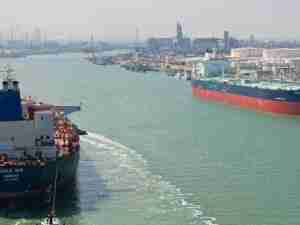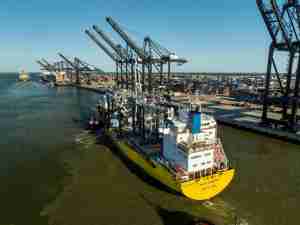Intense fighting between forces loyal to Libyan leader Muammar Gaddafi and rebels has already closed some oil terminals, and exports from Africa's third-largest producer have plummeted as foreign workers flee the escalating violence.
Shipping officials said the imposition of sanctions by the European Union, the United States and other countries will deal another severe blow to Libya's economy and choke shipping activity, which the country depends on both for transporting its oil and also importing needed food and consumer goods.
"Between the uncertainty of applicable law including sanctions, war risk and simple want of business, shipping to Libya is essentially frozen, if not dead for the foreseeable future," said J. Peter Pham, an African security adviser to European and U.S. governments and companies.
EU leaders were meeting in Brussels on Friday to discuss the situation in Libya and other countries in North Africa.
A series of sanctions, imposed over the past two to three weeks in response to the firing by Gaddafi forces on protestors, include the freezing of government assets. The move has already virtually paralysed oil trading as banks decline to clear transactions in dollars due to U.S. measures.
"Payment to Libyan entities is difficult due to sanctions, and this will undoubtedly restrict trade in the short to medium term even if crude production picks up in the near future," said Philip Roche, a partner with law firm Norton Rose.
Michelle Linderman, a partner with law firm Ince & Co, said sanctions are a big headache and worry for shipping groups.
"Companies do not want to get it wrong and end up with huge fines or go to jail in the worst case scenario," she said. "There is a potential that trade with Libya will become virtually impossible in the event that more sanctions are introduced."
Contract Nightmare
Maritime lawyers say any shipping deal with a country hit by sanctions involves high compliance costs, which may deter trade.
"They have to spend a lot of time on every single contract, trying to work out who they can contract with, whether there is any risk of breaching sanctions and where the payments are going," Linderman said.
"The bigger problems are for the smaller companies which don't have staff available to make all the checks ... and it's easier for them to say we won't go there at all."
Trade sources say the Gaddafi government has interests in many major Libyan commercial entities, which creates a risk that payments made to harbor authorities by a ship owner or agent may fall foul of sanctions.
"Owners and charterers will have to take care that oil is loaded only at ports known to no longer be under the control of the government and that money for such cargoes does not end up in the hands of those who are subject to the sanctions," a senior shipping official said. "It's not an easy proposition."
A ship insurance source said underwriters may add an additional war risk premium on shipments. London's marine insurance market last week already added Libya to its list of high-risk areas, which may also take its toll.
Oil-rich Libya typically imports large quantities of grains, but sanctions, heavy fighting and higher insurance costs are expected to hit shipments, European traders said.
They said regular grain flows to Libya were badly hit and the country was expected to rely in the short term on emergency food aid and possible supply from neighbouring countries to supplement existing grain reserves.
"I don't know who is going to risk firstly selling to Libya and then delivering there," said one trader.
"The market will reconsider the destination once the situation has stabilised. This is going to take some time."
While rebels via the National Libyan Council have been making moves to create a parallel economy, sources said










